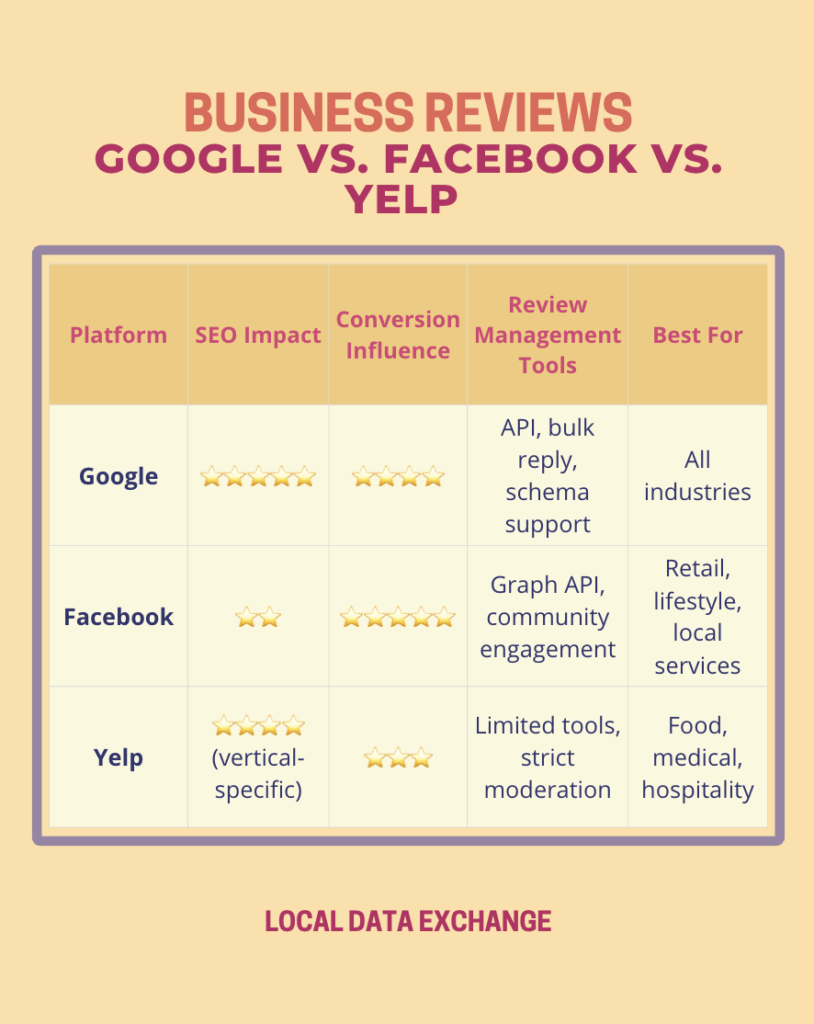Reviews are not just social proof, they are ranking signals, trust indicators, and AI training data. But not all review platforms are created equal.
For SaaS SEO providers managing multi-location brands, the question is no longer “Should we monitor reviews?”, it’s “Which reviews actually move the needle?”
Between Google Business Profile (GBP), Facebook, and Yelp, each platform plays a different role in how customers discover, evaluate, and convert and how search engines interpret trustworthiness.
Let’s break down what each review platform really contributes to local SEO, AI discoverability, and brand visibility at scale.
Google Business Profile Reviews: The SEO Powerhouse
Why It Matters:
Google is the front door of local search. GBP reviews directly influence visibility in:
- Ranking: Quantity, freshness, and diversity of reviews contribute to local pack rankings.
- Keyword Extraction: Google highlights relevant terms (e.g., “fast service,” “family-friendly”) from reviews in SERPs.
- Sentiment Signals: Patterns in reviews can impact how Google interprets quality and relevance.
- AI Integration: Google’s own generative search (SGE) pulls from GBP data and may summarize reviews in conversational results.
Technical Considerations:
- Use GBP APIs to programmatically monitor and respond to reviews per location.
- Implement structured data (review, aggregateRating) on landing pages that reflect review metrics.
- Monitor for review flagging or removal, especially if rebranding or relocating.
SaaS Takeaway: Google reviews are not optional, they’re core data. Your platform must surface them, respond at scale, and measure their influence on rankings and conversions.
Facebook Reviews: Social Proof That Drives Engagement
Why It Matters:
Facebook reviews (now “Recommendations”) are less about rankings and more about conversion influence. For many users, Facebook is the first place they check for:
- Photos of real customer experiences
- Business updates or hours
- Word-of-mouth from friends
Where Facebook Reviews Show Up:
- Facebook Pages (especially mobile)
- Google Search (if Facebook Page is indexed)
- Messenger chatbots and Local business tabs
What Makes Them Unique:
- Reviews are more story-driven where users write longer narratives.
- Meta platforms (Instagram, Threads, Facebook) cross-reference reviews for ad relevance.
- Facebook’s Local search still exists and is used by 1 in 5 users to find nearby businesses.
Technical Considerations:
- Use the Meta Graph API to check page health, ratings, and completeness.
- Monitor mentions and tags, which aren’t “reviews” but still influence local perception.
- Facebook doesn’t support structured review markup, so reviews must be surfaced via feed or widgets elsewhere.
SaaS Takeaway: Facebook reviews don’t boost rankings. They boost trust and conversion, especially for businesses that rely on community engagement or social visibility.
Yelp Reviews: Authority for High-Intent Niches
Why It Matters:
Yelp remains a key discovery and review platform in certain verticals:
- Restaurants, hospitality, wellness
- Legal, medical, home services (especially in urban areas)
- Travel and high-ticket B2C
How Yelp Reviews Influence SEO:
- Yelp listings rank organically for branded and category keywords (“best sushi downtown Denver”).
- Google often pulls Yelp snippets into rich snippets or AI-generated summaries.
- Apple Maps uses Yelp for reviews, images, and NAP data, making it crucial for iOS discovery.
Yelp’s Influence Beyond Its Own Platform:
- Powers review data in Apple Maps, Siri, TripAdvisor, and select automotive nav systems.
- Frequently cited by AI search engines due to its depth, structure, and moderation policies.
Technical Considerations:
- Yelp doesn’t allow direct review management via public APIs.
- Use scraping monitors or partner integrations to track reviews by location.
- Be cautious: Yelp aggressively filters reviews, especially those seen as incentivized or suspicious.
SaaS Takeaway: Yelp’s value is vertical-specific. Your platform should emphasize it when working with hospitality, food, or regulated industries and be transparent with clients about filter risks.
So, Which Reviews Actually Matter Most?
Here’s a side-by-side breakdown:

| Platform | SEO Impact | Conversion Influence | Review Management Tools | Best For |
| ⭐⭐⭐⭐⭐ | ⭐⭐⭐⭐ | API, bulk reply, schema support | All industries | |
| ⭐⭐ | ⭐⭐⭐⭐⭐ | Graph API, community engagement | Retail, lifestyle, local services | |
| Yelp | ⭐⭐⭐⭐ (vertical-specific) | ⭐⭐⭐ | Limited tools, strict moderation | Food, medical, hospitality |
Key Strategies for SaaS Platforms Managing Reviews
To support clients effectively, your SaaS SEO platform must offer:
- Centralized dashboard: Aggregate Google, Facebook, and Yelp reviews by location.
- Sentiment analysis + review tagging: Classify common themes (pricing, service, wait time).
- Review-to-ranking attribution: Correlate review trends with keyword movement per location.
- Approval workflows: Let brands pre-approve or suggest responses before publishing.
- API monitoring: Watch for new reviews and automate response SLAs (e.g., reply within 48 hours).
Great reviews are powerful. Consistent review workflows across every platform? Even more powerful.


